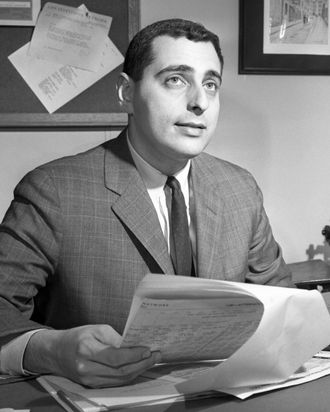
Even if his name is unfamiliar, you’ve probably watched (or at least heard of) one of the TV classics Fred Silverman helped put on the air. Between 1970 and 1981, Silverman headed three different networks, green-lighting major hits at all of them: All in the Family, The Mary Tyler Moore Show, Good Times, and M*A*S*H for CBS; Charlie’s Angels, Roots, Fantasy Island, and The Love Boat at ABC; Diff’rent Strokes, The Facts of Life, and The Smurfs on NBC. His success was such that in 1977, Time magazine put him on its cover, dubbing him “The Man With the Golden Gut.” Silverman, one of the most influential and successful television programmers of all time, died Thursday. He was 82.
Silverman began his network career in 1963, when he joined CBS. His string of hits started in 1970, when he was put in charge of program development at the Eye network and quickly put in place a major philosophical shift. He engineered what would be known as “the Rural Purge,” in which CBS canceled a slew of series (many still successful) that were deemed to be too alienating to younger viewers and those outside the heartland— shows such as Green Acres and The Beverly Hillbillies. Instead, Silverman started looking for shows which would appeal to the then- up-and-coming baby-boomer generation (no, really, boomers used to be hip!) being chased by advertisers. The result was decade-defining hits such as All in the Family and Mary Tyler Moore, plus populist faves such as Canon, Kojack, and Sonny & Cher.
The success Silverman had at CBS caught the eye of the bosses at ABC, who recruited Silverman in 1975 to rescue the perennial ratings loser that was the network. Silverman leaned hard into the youth strategy he’d explored at CBS, but this time without aiming first for quality. He green-lit a wave of bright, bouncy comedies and dramas which critics loathed but young America loved. Shows such as the aforementioned Charlie’s Angels, plus Three’s Company, Wonder Woman, and the Battle of the Network Stars series of specials — so-called “Jiggle TV”— played up the sex appeal of female stars (or, as we’d put it today, objectified women in crass pursuit of ratings). Somehow, amid this push to lowest-common-denominator television, Silverman managed to put Roots on the air, too. Silverman’s combined efforts worked, pushing ABC to the top of the Nielsens for the first time in its history. His success also hastened TV’s decision to start focusing on demographics, by programming for adult audiences under 50 rather than trying to appeal to all audiences.
Silverman’s talents were then noticed by his rivals at NBC, which had been pushed to the bottom of the ratings after Silverman had revived ABC. He joined the Peacock in 1978, but this time, Silverman’s streak of successes hit some bumps. He injected new life into NBC’s comedies with shows beloved by middle-school Gen-Xers of the day (Diff’rent Strokes, Gimme a Break, Here’s Boomer), and worked similar magic on Saturday mornings with Smurfs and a new version of The Flintstones. Silverman also was ahead of his time, anticipating the reality boom of the 2000s with Real People, and giving a daytime show to a young comic named David Letterman. But Silverman’s NBC tenure was just as notable for some legendary, big-budget bombs: variety show Pink Lady and Jeff; “comedy” Hello, Larry; and most notoriously, Supertrain. You don’t even have to Google those shows to know they stunk.
After nearly a dozen years as one of TV’s most powerful executives, Silverman transitioned to a career as an independent producer. He had a string of middlebrow hits such as In the Heat of the Night, The Father Dowling Mysteries, Diagnosis: Murder, and Matlock, all of which lived for decades in syndication following long network runs. Silverman briefly returned to the network fold in the early 2000s as an adviser at ABC, and he was still selling shows until about a decade ago. But it was clear to anyone who talked to him that he still missed the days of running a network. “You don’t have the accouterments of power,” Silverman told the New York Times in 1989, recounting the glory days, while, as the paper put it, “lighting up a Salem over a low-key Chinese lunch in the restaurant of his Wilshire Boulevard office building.” Instead of running the show, “You are just one of several hundred people trying to do the same thing— to earn a living.” Still, even long gone from being in charge of a major company, Silverman told the Times he never considered doing anything other than TV. “This is what I do,” he said. “What was I going to become, an architect?”




